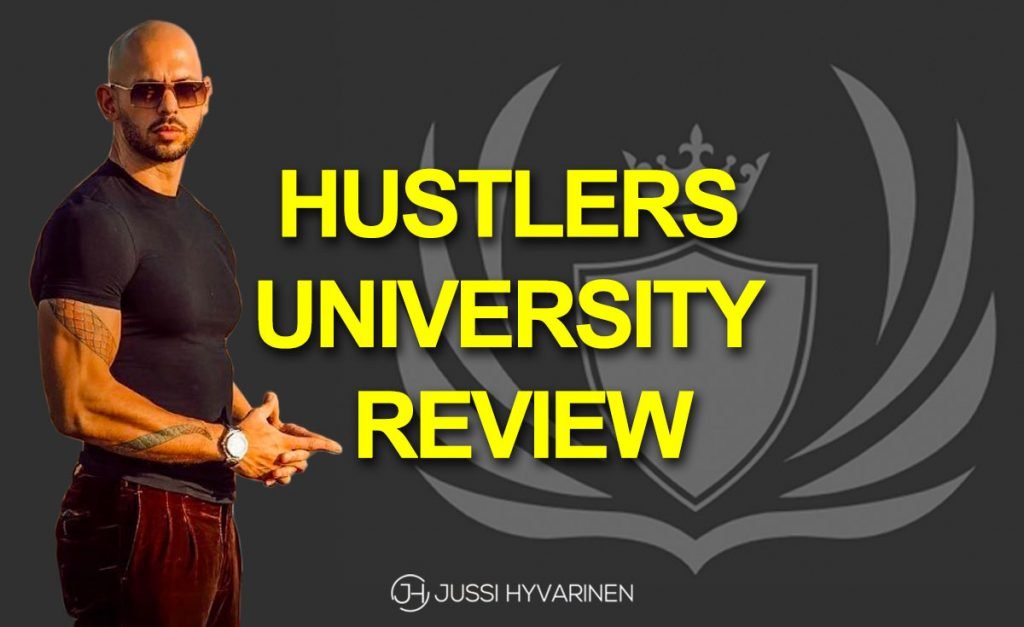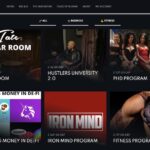How many people signed up for Hustlers University? This question, once shrouded in secrecy, now sparks curiosity and debate. The online program, promising a shortcut to wealth and success, captivated a global audience, drawing in thousands of aspiring entrepreneurs. But the program’s rapid rise and subsequent downfall left many wondering about its true impact and the number of individuals who embraced its promises.
Hustlers University, founded by Andrew Tate, presented a unique blend of business education, self-improvement, and controversial marketing tactics. Its curriculum covered a wide range of topics, from online marketing and sales to personal development and social media strategies. The program’s popularity was fueled by its aggressive marketing campaigns, charismatic founder, and promise of quick financial gains. However, its success was also marred by allegations of unethical practices, misleading claims, and questionable content. As the program faced scrutiny and backlash, it eventually shut down, leaving a trail of questions and unanswered inquiries about its true nature and impact on its members.
Hustlers University
Hustlers University (HU) is an online program marketed as a “business school for hustlers.” It aims to teach individuals how to generate income through various online methods, often referred to as “side hustles.”
Purpose and Goals
The primary goal of HU is to empower individuals to become financially independent by providing them with the skills and knowledge to build profitable online businesses. The program emphasizes a practical approach to learning, focusing on real-world strategies and techniques that can be implemented immediately. HU aims to help its students develop a “hustler mentality,” characterized by resourcefulness, adaptability, and a relentless pursuit of success.
Target Audience
HU’s target audience encompasses a diverse range of individuals seeking to:
- Increase their income streams.
- Develop new skills and knowledge in online business.
- Become financially independent and escape the traditional 9-to-5 job.
- Learn how to leverage online platforms to generate revenue.
The Curriculum and Content of Hustlers University
Hustlers University, despite its controversial nature, boasts a curriculum designed to teach individuals various online money-making strategies. The program offers a diverse range of courses and modules, covering topics like affiliate marketing, e-commerce, dropshipping, and social media marketing. While the effectiveness and legitimacy of these methods are debated, the program claims to provide valuable knowledge and skills to help participants build successful online businesses.
Affiliate Marketing
Affiliate marketing is a core focus of Hustlers University. This strategy involves promoting other companies’ products or services on your website or social media platforms and earning a commission for each sale generated through your referral link. The program teaches participants about selecting profitable niches, finding high-converting products, building a strong online presence, and driving traffic to their affiliate links.
E-commerce and Dropshipping
Hustlers University also delves into the world of e-commerce and dropshipping. This approach allows entrepreneurs to sell products online without maintaining physical inventory. The program provides guidance on setting up online stores, sourcing products from suppliers, managing orders, and handling customer service. Participants learn about finding profitable niches, analyzing market trends, and optimizing their e-commerce operations.
Social Media Marketing
Social media plays a crucial role in online business success, and Hustlers University recognizes its importance. The program covers strategies for building a strong social media presence, engaging with target audiences, creating compelling content, and running effective advertising campaigns. Participants learn about different social media platforms, content creation techniques, and strategies for maximizing reach and engagement.
Other Courses and Modules
Beyond the core areas mentioned above, Hustlers University offers a range of other courses and modules. These include:
- Copywriting: Mastering the art of writing persuasive and engaging copy is essential for online marketing. Hustlers University teaches participants how to craft compelling headlines, write effective sales letters, and create compelling content that drives conversions.
- Email Marketing: Building and nurturing an email list is crucial for online businesses. The program provides guidance on email list building, crafting engaging email campaigns, and automating email marketing processes.
- (Search Engine Optimization): Optimizing websites for search engines is crucial for driving organic traffic. Hustlers University teaches participants about research, on-page optimization, and off-page strategies.
- Paid Advertising: Running paid advertising campaigns on platforms like Google Ads and Facebook Ads can be an effective way to reach a wider audience. The program covers strategies for setting up and managing paid advertising campaigns, targeting specific audiences, and optimizing campaign performance.
The Business Model and Revenue Generation

Hustlers University (HU) operated on a membership-based business model, generating revenue primarily through subscription fees paid by its members. The program offered a range of courses and resources designed to teach individuals how to make money online.
Revenue Generation, How many people signed up for hustlers university
HU’s revenue stream was primarily derived from membership fees. The program offered various membership tiers, each with its own pricing and benefits. Members paid a recurring monthly fee to access the platform’s content and community.
Pricing Structure and Membership Options
HU offered different membership options, each with its own pricing structure and benefits.
- Free Membership: This tier provided access to basic content and community features, but it was limited in scope. It was essentially a way to entice users to sign up for the paid version.
- Basic Membership: This was the entry-level paid membership, offering access to a wider range of courses and resources. It provided a more comprehensive learning experience than the free membership.
- Premium Membership: This tier offered the most comprehensive access to HU’s content and community. It included exclusive courses, workshops, and personalized support from mentors. It was the most expensive option, but it also provided the most value.
Ethical Considerations and Best Practices
Hustlers University, despite its name, faces significant ethical considerations due to its focus on “hustling” and its potential for exploitation. While the platform claims to teach legitimate business skills, its marketing and methods raise concerns about its ethical implications.
Ethical Considerations
The ethical considerations surrounding Hustlers University are complex and multifaceted. The platform’s name and marketing materials suggest a focus on “hustling,” which can be interpreted as a euphemism for unethical or exploitative practices. The potential for misleading claims about earning potential and the lack of transparency regarding the curriculum raise concerns about potential fraud and deception. Additionally, the emphasis on quick profits and “get-rich-quick” schemes could encourage risky or unethical behavior among participants.
Best Practices for Online Education and Business Models
Online education platforms, especially those promoting business skills, must adhere to ethical best practices to ensure responsible and sustainable learning. Transparency, accurate representation of earning potential, and a focus on ethical business practices are essential.
- Transparency: Platforms should be transparent about their curriculum, instructors, and their own business model. This includes clearly stating the risks and potential downsides of the skills being taught.
- Accurate Earning Potential: Exaggerated or misleading claims about earning potential should be avoided. Platforms should provide realistic expectations and emphasize the hard work and dedication required for success.
- Ethical Business Practices: Platforms should promote ethical business practices and discourage exploitative or unethical methods. This includes teaching participants to be honest and transparent with their customers and to prioritize ethical behavior over quick profits.
Responsible and Sustainable Online Learning
Responsible and sustainable online learning involves more than just delivering educational content. It’s about fostering a supportive and ethical learning environment that empowers participants to make informed decisions and to build sustainable businesses.
- Community and Support: Platforms should encourage a sense of community and provide support to participants. This can include forums, mentorship programs, and other resources to help learners navigate challenges and build their businesses.
- Long-Term Value: Focus on teaching skills that have long-term value and can help participants build sustainable businesses. This includes emphasizing ethical practices and responsible marketing.
- Continuous Improvement: Platforms should be committed to continuous improvement, adapting their curriculum and practices based on feedback from participants and industry best practices.
The Future of Online Education and Entrepreneurship: How Many People Signed Up For Hustlers University

The landscape of online education and entrepreneurship is rapidly evolving, driven by technological advancements, shifting learning preferences, and the rise of the gig economy. These forces are shaping the future of these fields, creating both challenges and opportunities for online learning platforms.
Trends and Innovations
The trends and innovations shaping online education and entrepreneurship are creating new possibilities for learning and earning.
- Artificial Intelligence (AI) and Machine Learning (ML): AI and ML are transforming online learning by personalizing learning experiences, providing real-time feedback, and automating tasks like grading. AI-powered platforms can analyze student data to identify learning gaps and suggest personalized learning paths, while ML algorithms can create adaptive learning environments that adjust to individual learning styles and progress.
- Virtual Reality (VR) and Augmented Reality (AR): VR and AR are immersing learners in interactive and engaging learning environments. VR simulations can provide realistic training experiences in various fields, such as healthcare, engineering, and aviation, while AR can overlay digital information onto the real world, enhancing learning experiences.
- Micro-Learning and Bite-Sized Content: The increasing demand for flexible and accessible learning has led to the rise of micro-learning and bite-sized content. This format allows learners to acquire new skills and knowledge in short, focused sessions, fitting seamlessly into busy schedules.
- Gamification and Interactive Learning: Gamification and interactive learning techniques are making online learning more engaging and effective. By incorporating game mechanics, challenges, and rewards, platforms can motivate learners and foster a sense of accomplishment.
- Blockchain Technology and Digital Credentials: Blockchain technology is enabling secure and transparent verification of digital credentials, making it easier for learners to showcase their skills and achievements. Blockchain-based platforms can also create decentralized learning ecosystems where learners can earn and exchange digital badges and certificates.
Challenges and Opportunities
The evolving landscape of online education and entrepreneurship presents both challenges and opportunities for online learning platforms.
- Maintaining Quality and Credibility: As the online learning market becomes more crowded, maintaining quality and credibility becomes paramount. Platforms need to ensure that their content is accurate, up-to-date, and delivered by qualified instructors.
- Addressing the Digital Divide: The digital divide remains a significant challenge, with limited access to technology and internet connectivity hindering participation in online learning. Platforms need to develop strategies to reach learners in underserved communities.
- Ensuring Learner Engagement and Motivation: Keeping learners engaged and motivated in an online environment can be challenging. Platforms need to create interactive and engaging learning experiences that cater to different learning styles.
- Adapting to Changing Learning Needs: The rapidly changing job market demands continuous learning and upskilling. Platforms need to be agile and adaptable to provide relevant and in-demand courses.
- Building a Sustainable Business Model: Developing a sustainable business model for online learning platforms is crucial for long-term success. Platforms need to explore different revenue streams and pricing models to attract and retain learners.
The story of Hustlers University serves as a cautionary tale about the allure of quick wealth and the potential pitfalls of online education. While the program may have offered some valuable insights and resources, its questionable practices and controversies cast a shadow over its legacy. Ultimately, the true impact of Hustlers University remains a subject of debate, but it undoubtedly left an indelible mark on the online education landscape and sparked important conversations about ethical business practices and the responsible pursuit of success.
While the exact number of people who signed up for Hustlers University remains a bit of a mystery, it’s safe to say the program garnered a significant following. If you’re looking for financial guidance and support to achieve your own financial goals, consider reaching out to a financial aid advisor near me who can provide personalized advice and strategies.
Whether you’re seeking to fund your entrepreneurial ventures or simply manage your finances more effectively, a financial advisor can be a valuable resource. And who knows, perhaps you’ll find a way to apply those lessons to your own hustling endeavors.
While the exact number of people who signed up for Hustlers University remains a bit of a mystery, it’s widely reported that the program attracted a massive following. Some speculate that the program’s popularity stemmed from its promise of financial success, with claims of earning thousands of dollars through various online hustles. Interestingly, Hustlers University also offered a hustlers university diploma , which added another layer of intrigue to the program’s appeal.
Regardless of the exact number of participants, Hustlers University undoubtedly captured the attention of a large audience seeking to leverage online opportunities for financial gain.
While the exact number of people who signed up for Hustlers University remains unclear, it’s a testament to the growing interest in alternative methods of financial success. If you’re looking for more traditional financial guidance, consider checking out financial advisor ratings near me to find a qualified professional in your area. Whether you’re seeking unconventional strategies or traditional advice, finding the right path to financial security is crucial.







